Creating a Science Pipeline
With each headline-grabbing, record-breaking storm or once-in-a-lifetime weather event, the challenges facing America’s coastal regions become clearer. Stronger, more frequent storms, record drought conditions, changing migration patterns in fish stocks, and rising sea levels are just some of the very real challenges coastal communities face today. These now-frequent events reinforce the importance of establishing a steady stream of competent, experienced, and thoughtful scientists and policymakers who will employ science-based information to address the challenges of changing conditions and lead California to effective and inclusive policies and toward a more engaged and informed citizenry.
Many California agencies are involved in the management and planning of coastal resources, work that requires a large number of well-trained, environmentally literate, and politically astute individuals to manage future ocean and coastal problems. Currently, only a few statewide educational programs provide technically trained graduate students with practical experience in marine resource management. The California Sea Grant State Fellowship Program, established in 1987, recognized the need for educating the next generation of marine and coastal policymakers early on.
This program provides a unique educational and professional opportunity for graduate students interested in California’s coastal and marine resources and in the policy decisions affecting those resources. Modeled after the highly successful national John A. Knauss Marine Policy Fellowship Program (https://seagrant.noaa.gov/knauss-fellowship-program/), the State Fellowship Program is designed to provide recent graduates with opportunities to acquire hands-on experience in the planning and implementation of coastal and marine resource policies and programs in the state of California. It matches highly motivated, outstanding graduate students (near completion of degree or recently completed) with hosts in municipal, state, or federal agencies and in science and conservation organizations within California. Since the program’s inception, over 300 fellows have been successfully placed in more than 40 host organizations (see Figures 1 and 2 and Boxes 1 and 2 for examples).
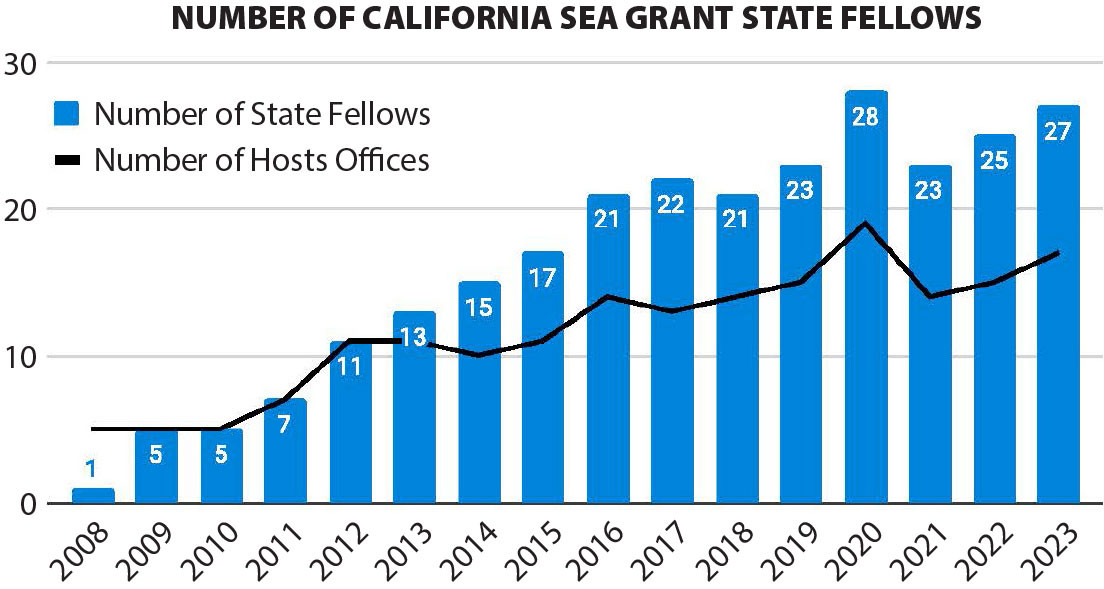
FIGURE 1. Growth of the California Sea Grant Fellows over 16 years. > High res figure
|
Fellowship Recruitment and Placement Process
California Sea Grant’s Science Integration Team works collaboratively with the Communications Team to broadly advertise the State Fellowship Program by utilizing the program’s web pages, social media, and an email database containing over 5,000 contacts, including scientists, students, agency staff, news media, legislators, industry representatives, marine science libraries, conservation, nonprofit organizations, and others. Fellowship applications are reviewed in a two-stage process consisting of a review of written applications and a subsequent interview. During both review stages, all applications are evaluated for eligibility, diversity, appropriateness of experience, communications skills, academic background, community and extracurricular activities, interest in the fellowship, and for personal characteristics such as initiative, adaptability, and analytical skills. State fellow alumni, with their unique perspectives and relevant experience, are also recruited to provide feedback during the process.
Fellowship assignments for each incoming class are based on interviews and ranking of preferences by both the selected finalists and participating hosts at a mandatory matching workshop held either virtually or in person in Sacramento. Placement of a fellow in each prospective host office is not guaranteed, and no applicant or finalist is guaranteed a fellowship.
Attracting Engaged Hosts
The State Fellowship Program is open for support by municipal, state, and federal agencies as well as nongovernmental organizations in California with mandates in coastal or marine research, policy, or management. Hosts provide an educational opportunity to fellows who will, in turn, provide substantial professional contributions to the office. Hosts are expected to supervise, mentor, and provide opportunities for fellows to be involved in substantive issues that support fellows’ professional and educational goals. The fellows are expected to engage with the host office full time, remotely and/or on site, and with other staff and/or leadership as appropriate. Hosts and fellows are responsible for agreeing on remote/virtual, on-site, and hybrid arrangements.
Host applications are screened for quality of the fellowship opportunity, level of educational benefit for the fellow, and the host office’s previous experience working with interns, fellows, or other mentoring/educational programs.
Funding, Engagement, and Professional Development
State fellows receive financial support of a monthly stipend and health insurance for the 12-month fellowship assignment. Both California Sea Grant (CASG) and the respective host agency contribute to this monthly award based on a cooperative interagency agreement. Hosts are expected to cover 75% of the cost of the first fellowship award per year and 100% of additional fellowship awards. Additional funds are provided to cover travel for any Sea Grant-coordinated state fellow meetings and other fellowship related travel or professional development activities. This travel expands on the fellows’ professional development and skill building within the host agencies and allows them to connect with their cohort statewide and nationally. Many of the state fellows attend, present, speak, and network at a variety of meetings, trainings, and conferences throughout their fellowship experience.
CASG has developed programming and content to facilitate the state fellows growing together as a cohort, beginning with an orientation at the outset of the fellowship year. Throughout the State Fellowship Program, CASG offers all fellows monthly check-ins along with professional development training. One common training is a meeting facilitation course provided by NOAA’s Office for Coastal Management. Each year, our program strives to respond to areas requested by a particular cohort for growth and learning. This has ranged from a science communication course to a regular topical webinar series to diversity, equity, inclusion, and environmental justice training. As fellows begin to wrap up their fellowships, CASG helps host career panels that invite state fellow alumni to share their experiences in the private, public, nonprofit, and academic sectors. The panels typically include early career, mid-level, and seasoned professionals in order to provide a range of perspectives and experiences. Additionally, each fellowship year finishes with the fellows providing presentations to their cohort about their unique fellowship experiences and sharing about projects, mentorship, training, and networking opportunities.
Over the course of the 12-month fellowship, there are opportunities for the state fellows to collaborate with the California Sea Grant Extension Program. During spring, fellows interact with extension specialists and hear about various extension project opportunities that align with their fellowship assignments or with their professional and career interests. These optional interactions are designed to provide additional opportunities for fellows to explore topics of interest, expand their networks, and increase the diversity of opportunities for engagement. Fellows choose a project of interest and coordinate with the relevant extension specialist(s) and their hosts to determine their level of availability for a particular extension project, contributing no more than two months spread out over the year.
Several other Sea Grant programs in the network have adopted marine policy fellowships of their own, inspired or modeled after the California Sea Grant State Fellowship Program (Box 3). For upcoming cohorts, CASG is planning to collaborate with the Sea Grant Fellowship Coordinators Network to leverage other Sea Grant programs as a resource for training, development, collaboration, and networking among state policy fellows across the region.
A Commitment to Diversity, Equity, Inclusion, and Accessibility
CASG is committed to increasing the diversity of the Sea Grant workforce. We prioritize diversifying the applicant pool for the State Fellowship Program to better reflect the population of California—which will help diversify the host agencies as well. To get there, CASG has taken steps to understand the barriers and create pipelines of access for graduate students to feel equipped and qualified to apply for the fellowship program. Targeted approaches will be reinforced or tested to advance our program’s commitment to diversity, equity, inclusion, and accessibility (DEIA).
Each applicant is asked how they heard about the fellowship opportunity. This information is used to validate the outreach methods that best translate to more applicants from universities, academic fields, and communities that previously have not applied to the State Fellowship Program. Each year we find new examples, key nodes, and the best ways to improve our marketing and outreach methods in an iterative process. One successful practice has been to identify from which eligible graduate programs in California there have been no applicants and to identify staff at those institutions who could share the opportunity with their students. With nearly 120 universities and colleges in California that offer graduate degrees, this strategy has led to easily trackable results.
To further highlight this focus on DEIA, materials within the Request for Application have been updated to explicitly ask applicants to comment on their own experiences with diversity. The personal statement prompt includes: “One to two paragraphs of the statement should illustrate (1) the applicant’s experience collaborating or engaging with people from diverse, including underserved, cultural, ethnic, and socioeconomic, backgrounds, and (2) how the applicant would incorporate principles of diversity, equity, inclusion, justice, and/or accessibility into their fellowship.” This explicit inclusion has empowered and encouraged applicants to be more thoughtful about addressing diversity, equity, inclusion, and environmental justice issues as they progress through the application review and matching process.
Through engagement with other fellowship programs and the University of California San Diego and Scripps Institution of Oceanography’s Diversity Office, the instructions and resources for State Fellowship alumni reviewers have been improved with guidance on reducing implicit bias and highlighting the need to recognize individual circumstances. Alumni reviewers are instructed to recognize that the “distance traveled” to reach particular achievements will differ among applicants. Some individuals will have the economic privilege to volunteer or work for low pay to gain experience in the environmental field. Others will have had to work regular jobs to pay for school. CASG values the endpoint of what applicants have achieved along with the personal leadership skills demonstrated along their journey to success.
In addition to enhancing our tracking of all applicants and fellows by graduate school, degree type, and degree title, CASG has embarked on tracking the demographic diversity of applicants to the State Fellowship Program. Each applicant has the opportunity to fill out a voluntary and anonymous questionnaire that collects data on age range, gender identity, disability, military status, and family education history (Figure 3).
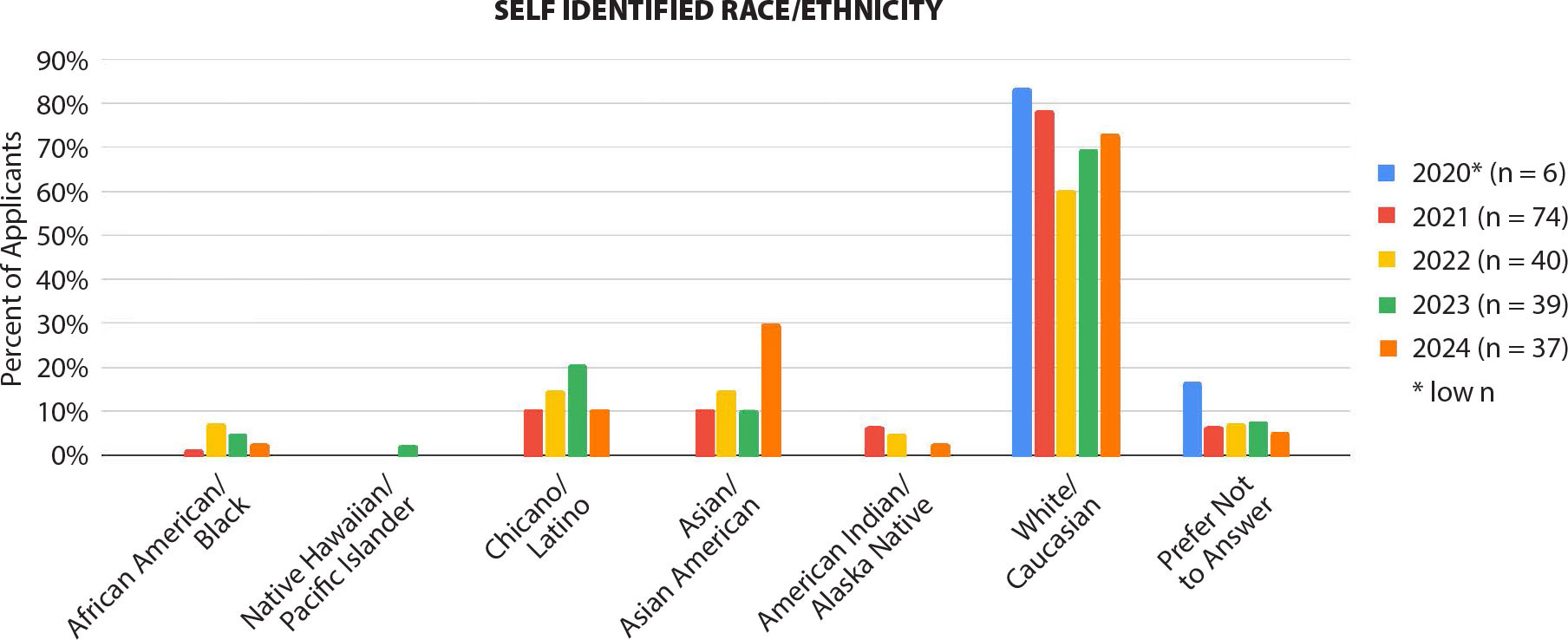
FIGURE 3. Self-identified race/ethnicity from all 2020–2024 State Fellowship Program applicants. > High res figure
|
As the State Fellowship Program continues to grow, California Sea Grant will explore expanding eligibility to allow applicants from outside the state of California. Currently, applications may be submitted by graduate students close to completing a degree (master’s, PhD, or JD) in a field related to conservation, management, protection, stewardship, public policy, or law of marine, coastal, and/or watershed environments, or areas that impact those environments, at a California University. CASG will try expanding the program to universities outside of the state of California to diversify our pool of applicants and increase accessibility for California residents who attend graduate programs in another state. Additionally, in 2020, CASG began collecting demographic data on state fellow applicants to improve our understanding of who is applying and if we are reaching graduate students from marginalized California communities, who often have experienced the most environmental and economic burdens in relation to coastal and ocean policy. As we continue to collect this information, CASG will reassess our efforts to ensure we are creating diverse pathways of access to our program.
Workforce development is an important goal of the greater Sea Grant network. The State Fellowship Program works closely with participating academic institutions and hosts to contribute toward a diverse, skilled, and environmentally literate workforce. We are also working to advance our shared commitment to DEIA by implementing new processes and programming for fellowship outreach, recruitment, placement, and engagement, including enhanced tracking of the demographic diversity of applicants and alumni. In doing so, we hope to continue providing the training opportunities and relationships needed to foster the growth of a thriving California Sea Grant State Fellowship network and career paths that support the needs of California’s diverse populations with science-informed decision-making and leadership surrounding the use and conservation of California’s coastal and marine resources.

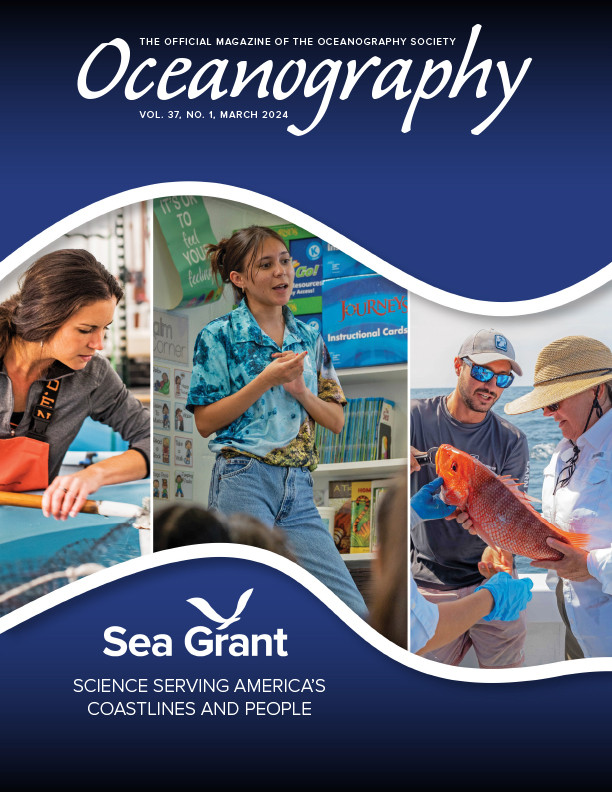

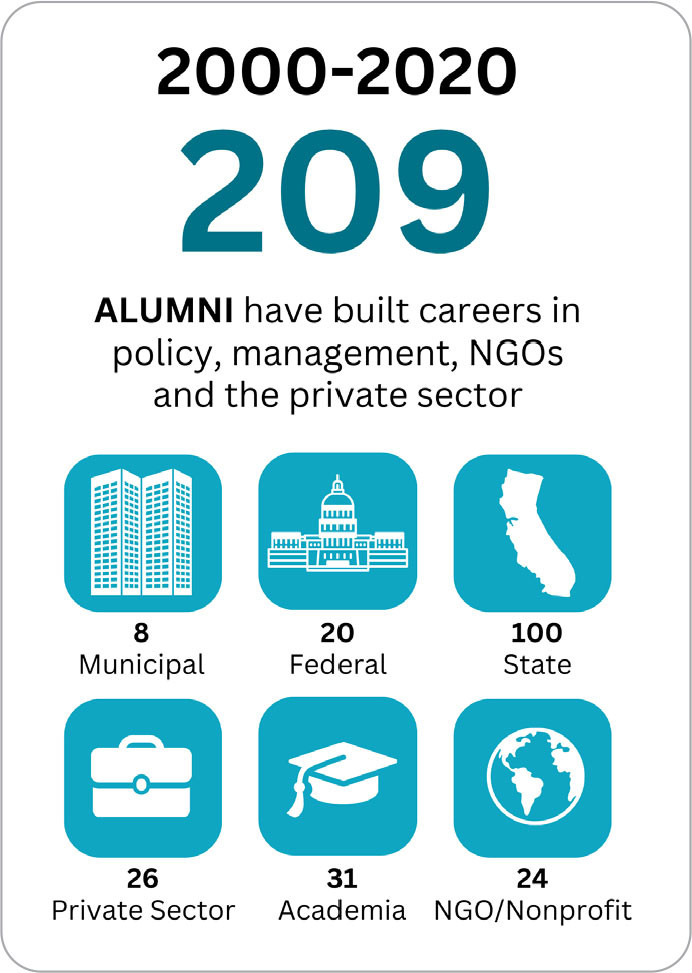
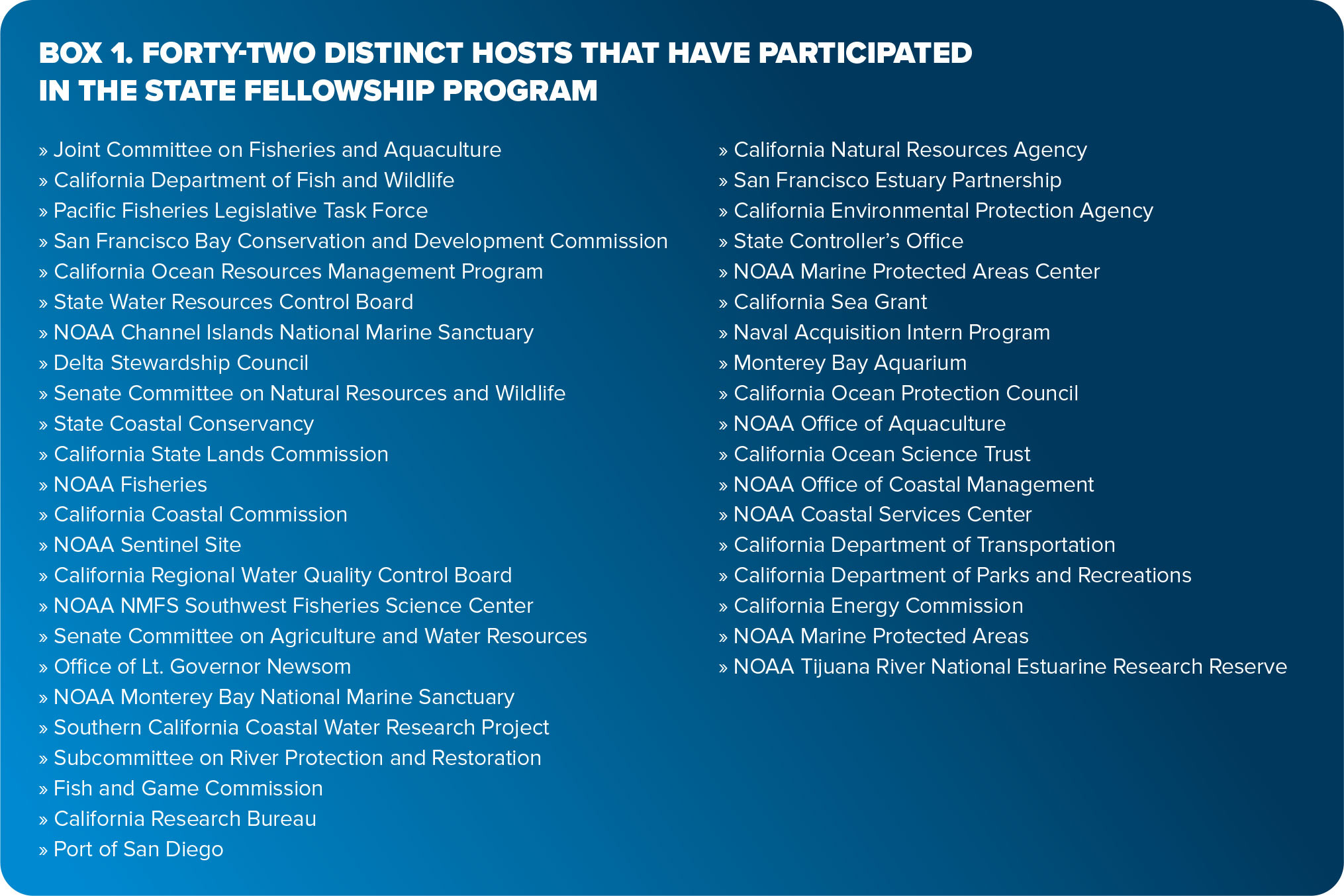 > High res box
> High res box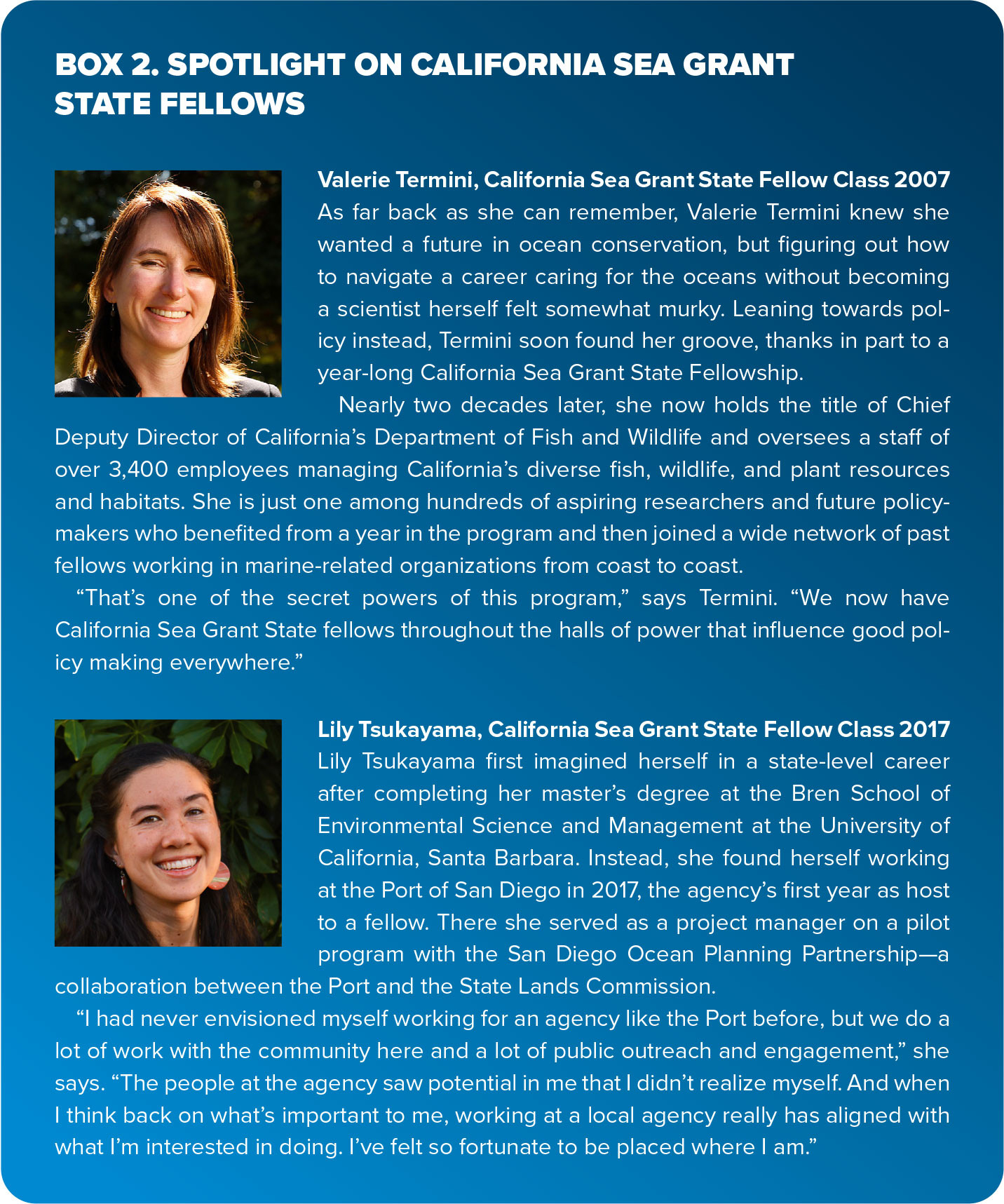 > High res box
> High res box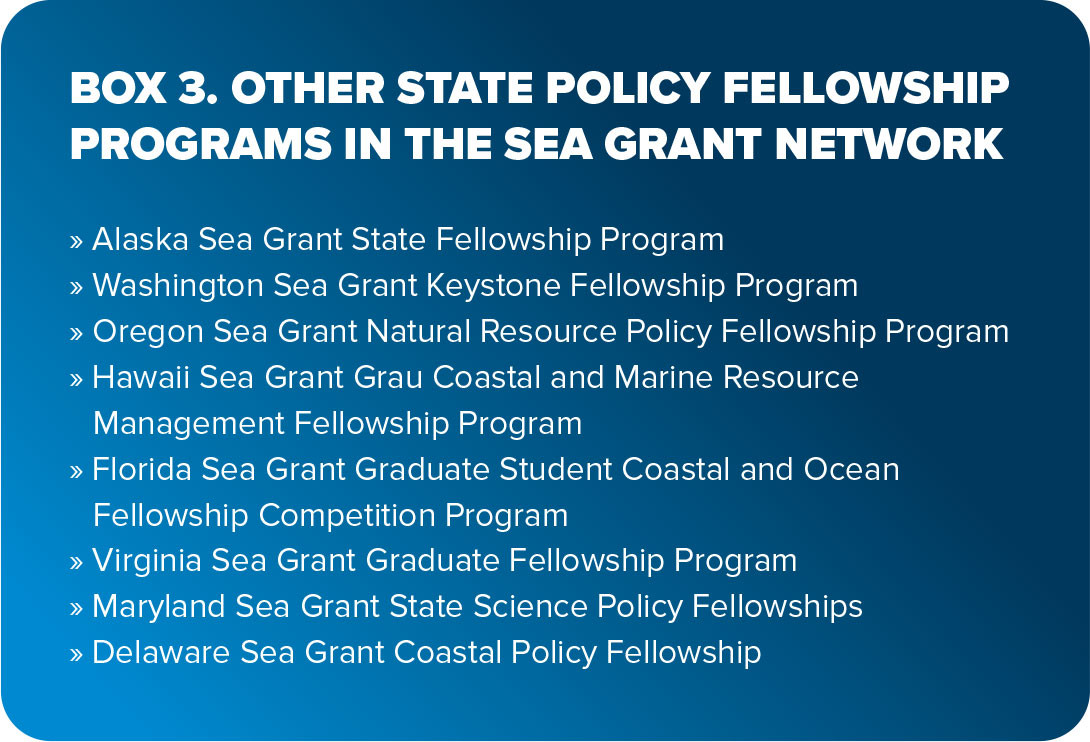 > High res box
> High res box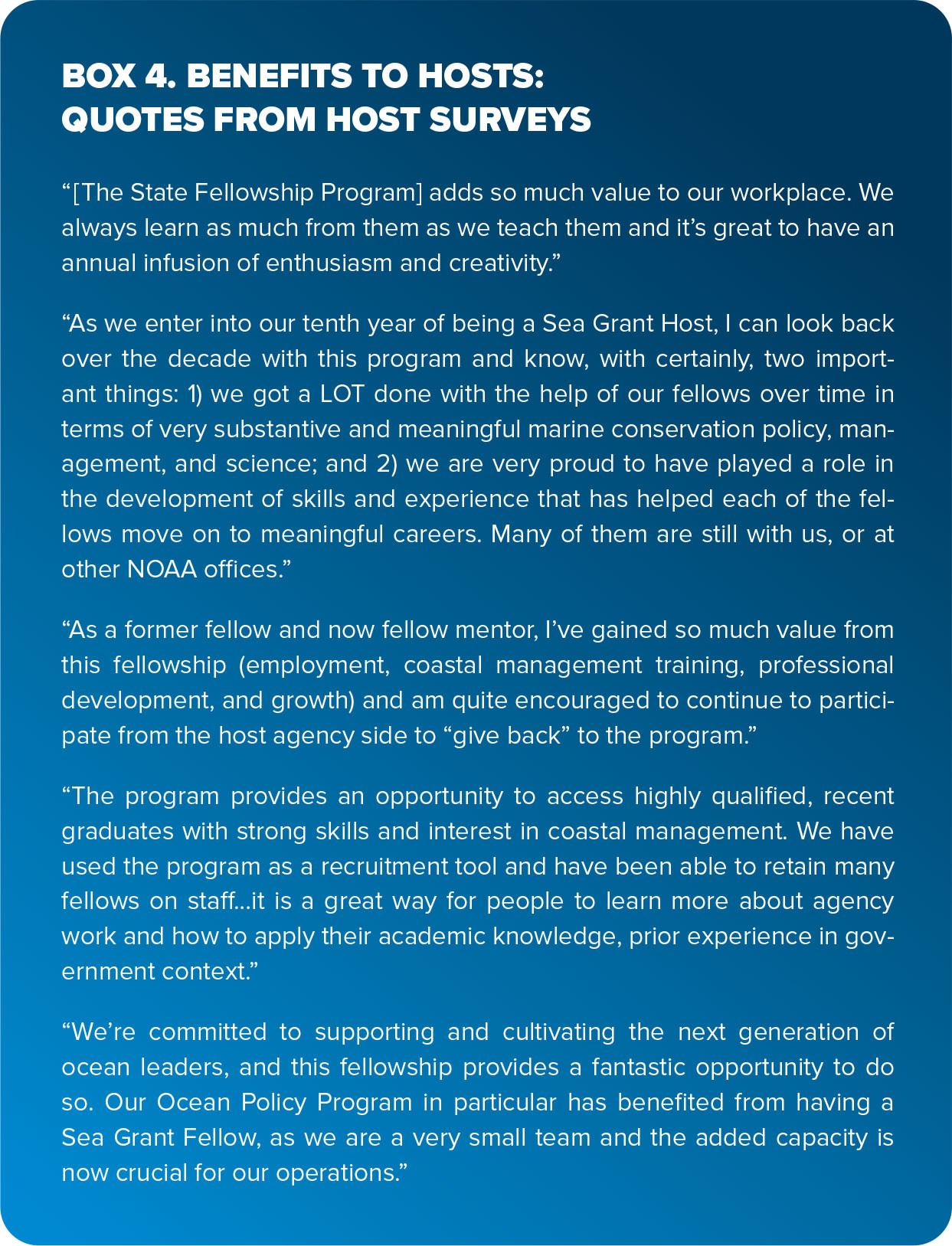 > High res box
> High res box